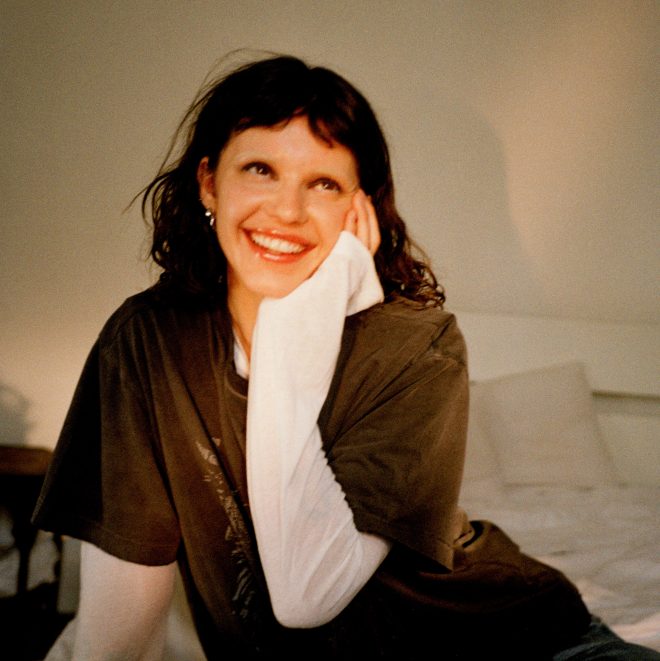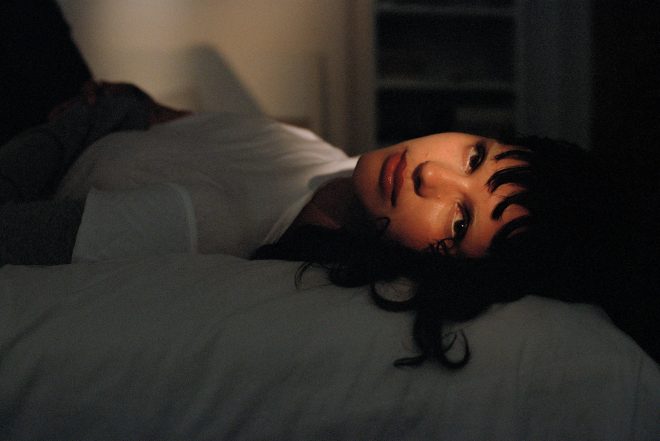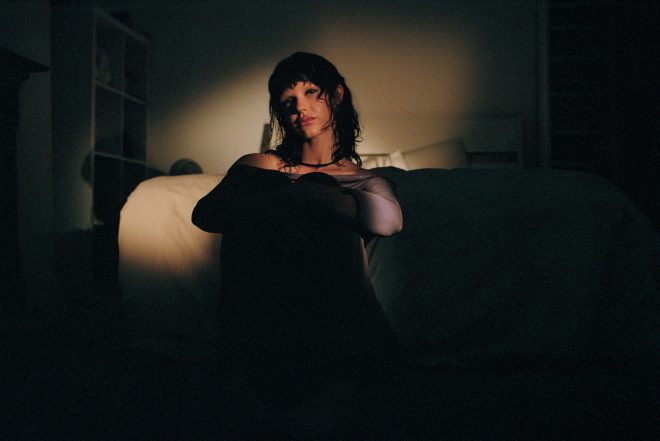X3butterfly: building worlds outside the system

On a quiet Berlin street, hours after the last track has dissolved into the night, x3butterfly walks home alone. An extended mix scores the city, humming in the background, while they retreat to their world of headphones, an improvised soundtrack that mirrors the glow of streetlights on wet pavement. It’s in these in-between moments, far from the crowd and the crush of the booth, that the Mexican-American artist reconnects with the core of who they are. “Who I am when the music stops is someone my inner child can be proud of,” they say. That self is not a fixed image, but a living thing, shaped by movement, curiosity, and the refusal to be boxed in.
To understand x3butterfly’s world, you have to follow them across continents and disciplines. Growing up in Detroit’s grit and rhythm, forged in Guanajuato’s queer underground, expanded in Berlin’s freedoms, and unraveled in New York’s intensity, their journey has been less about finding one identity than learning to inhabit many. Each city left an imprint, the raw foundation of home, the reclamation of heritage, the affirmation of gender fluidity, the confrontation with inner chaos. Along the way, they’ve navigated the jagged intersections of nightlife, activism, sex work, and survival, collecting the kind of truths that don’t fit neatly into a press bio.
In the booth, they channel all of it, ancestral echoes, political urgency, private memories, into a sound that’s as much invocation as entertainment. But offstage, x3butterfly is asking more complicated questions: How do you hold space for joy without softening your politics? How do you remain visible without being consumed? And what does it mean to build something lasting in an industry that thrives on erasure? Their answers, like their music, are unflinching and full of soul, tender where you expect armor, sharp where you expect softness, and always in motion.
When asked who they are when the music stops, x3butterfly doesn’t hesitate to go deep. For them, identity isn’t about the curated sheen of an artist persona; it’s about the underbelly, the quiet, mundane truths that shape a person far more than any set or stage.
“This is such a valuable question because it’s the underbelly, the covert, the mundane that defines you as a person and as an artist. What you convey to the world through your art is a culmination of all your experiences, your history, your generational trauma(s), the love you feel, the pain that you hold… This rawness, the real essence of someone, is what makes them and their work interesting. It’s not a craftily curated avatar, but the in-betweens, the thick of it. I want to know how you treat service workers, your guilty pleasures, your freaky anecdotes, what you’re currently reading, your cultural traditions, whether you find comfort in browsing grocery stores, or if they’re overwhelming, etc. Whatever! The little details. The glorification of individuals is myopic at best; I want to uplift artists because of their ethics, kindness, contributions to their community, and the genuine symbolism they embody.”“Who I am when the music stops, at least who I aspire to be, is someone my inner child can be proud of. That doesn’t have to take any one ‘fixed’ shape, but rather something malleable, adaptable, and ever-evolving. Exploring various media and cities requires a level of vulnerability that comes with risk, which is why I continually approach things with a childlike sense of curiosity. Many moments of inspiration arise from simply observing and being in both familiar and unfamiliar environments. I don’t want to impose a rigid identity, but rather stay attuned to the flow that my life’s trajectory has taken, and trust in the process that leads me where I am meant to be. The core of this is the spirit or the soul, and the commodification of art has been slowly depriving us all of it. I’m trying to find the harmony that affirms to me why I do what I do.”

That core, fluid yet unshakable, has been shaped by cities as much as by inner work. Detroit built the foundation. Guanajuato gave them an expanded sense of identity. Berlin offered space for gender and sexual freedom. New York allowed the unpacking of long-compartmentalized emotions. Each place, they explain, has altered their relationship with themselves in ways they are still tracing.
“It feels a bit like a chicken-or-the-egg paradox; the pinnacle of personal freedom has always been at the intersection of the external and internal. Detroit was the foundation; Guanajuato provided me with an expanded sense of identity, Berlin cultivated space for gender and sexual freedom, and NYC allowed me to unpack the numerous things I had compartmentalized. Each place provided me with something uniquely distinct, which broadened my understanding of myself. At times, it has been egregious, but recently I’ve finally begun to hold space and compassion for myself in ways I couldn’t do prior. I’m not sure if there was ever a turning point; I often feel pretty isolated. That’s not to say I don’t feel loved or have a lot of support in my life, but on an existential level, it’s difficult to understand exactly where my puzzle piece fits.”
One of the rare moments when that puzzle piece felt like it belonged came on a mountain in China.
“I semi-recently visited Mount Qincheng in the Sichuan province of China, which is the birthplace of the formalization of Daoism. This was notable because it was a time when I felt a rare, unfiltered kind of freedom. I align myself with many Daoist principles, and being there was incredibly clarifying. Over the past few years, I’ve been engaging in a dialogue with myself that didn’t exist before, and taking the time to understand who I am on a fundamental level, free from the cloudiness of external pressure. I started going into nature solo as much as possible and developing solid and consistent grounding practices.”
Growing up in Detroit with a Mexican-American background meant navigating multiple cultural realities, even if no one explicitly asked them to choose sides.
“My upbringing was culturally monolithic. Sides were never overtly expressed, but I recognized from an early age that there was family conflict. A lot of tensions came from attempting to have a voice in a household that only amplified shame. Shame is often taught and is one of the most challenging things to unlearn. My grandparents rarely allowed me to express myself, so I could never fully advocate for what I truly wanted without emotional ramifications. Leaving home at thirteen was the beginning of understanding what I desired for myself without having to quiet or suppress my voice. I didn’t have a proper relationship with my family in Mexico until I was in my early twenties. Coincidentally, that was around the same time I had come out as genderqueer. Establishing that relationship caused me to feel whole in a way that propelled other facets of my being that weren’t yet aligned, before that initial visitation. Not being able to embrace both sides of my cultural heritage fully has always left me with a fragmented sense of identity, but I’m actively trying to reclaim it now.”
That reclamation extended beyond personal identity into community leadership when they started Guanajuato’s first queer party.
“Visibility at some point becomes an essential moral obligation, to provide people who haven’t been given the grace of acceptance and love a chance also to be seen and heard in a space that feels safe and familiar to them. This is especially important in places that lack community infrastructure. Invisibility isn’t neutrality; it’s erasure.”

Nightlife has been both healing and hazardous for them.
“That is undoubtedly true, and finding a balance is arguably one of the most challenging aspects of working in nightlife. Nightlife comes with a plethora of temptations and enabling, which I think is pervasively embedded in the entertainment industry. Stressful situations can easily unfold into unhealthy coping habits and constant escapist tendencies. Growing up as a child actor, I quickly learned what it meant to self-monetize, which forced me to reckon with the reality of working at a young age. Naturally, that’s a lot of pressure on a child. As much as I loved to be a performer, it’s simultaneously always been work for me. The harsh reality for an artist is facing numerous rejections, as well as working multiple jobs in an attempt to sustain their creative life. I became a sex worker while living abroad for precisely that reason.
The industry often skates around controversy because honesty isn’t always palatable, unless it can be packaged carefully and monetized. People would rather compromise their morals for money, which is, unfortunately, as old as any story of power and empire. The BDS movement is only starting to gain traction, and it’s already nearly two years into the genocide. It’s devastating that sociopolitical topics that shouldn’t be brave to speak on become newsworthy headlines when they should just be normal. I want to push for more honesty in this scene, because it’s the only way ‘controversy’ slowly becomes destigmatized. Vulnerability in a public sphere is an opportunity to be torn down, but taking that risk is necessary.”
Grounding themselves after a performance is less about ritual than about instinct.
“I don’t have any one specific grounding routine. One of my favorite activities is walking home from the venue after I’ve played, while listening to an extended mix that echoes and narrates my surroundings. Otherwise, it can look like decompressing alone and meditating, being pulled away by friends for a chat, cooking a meal and watching an anime or film, or having a cigarette outside the venue and people-watching. I don’t actually smoke, but I bought some of the capsule-flavored ones in East Asia on my most recent tour because you can’t get them in the States. Trying new things is indeed a guilty pleasure of mine. It’s rare that I ever feel like just a performer, because I often make mistakes in both my professional and personal life. I’m pro Make More Mistakes! It’s a friendly reminder that we’re not machines.”
The challenges of the music industry don’t stop at mental health; they extend into the politics of gender and representation.
“Apart from not truly being seen a majority of the time, it’s also objectification, patronizing attitudes, inequivalent fees, degrading comments; honestly, the list goes on. The male camaraderie is undeniably palpable, to the point where just being unapologetically you online or otherwise is somehow deeply threatening. My aesthetic choices are politicized, my technical ability has been questioned, and my intelligence has been castigated; things most AFABs or other genderqueer/trans artists are constantly dealing with.”
Even so, they refuse to be consumed by the expectation to educate at the expense of their own joy.
“I draw boundaries. To be honest, I don’t mind having an honest conversation with people who want to learn; it’s just about finding the right time and place. After setting the post, I usually need a moment to decompress, but then I ideally like to be an open book. The best moments of clarity typically come from two people who don’t walk the same path of life, but can come to a mutual understanding. That’s why I believe sex workers deserve all of the flowers; they’re healers. I think it’s important to mention as well that not every sex worker may define their work as healing, which is completely valid and entirely their prerogative.”
Listening to x3butterfly talk, you realize how rare this kind of candor is. Most artists refine their stories into something marketable, something that presents well in a press release. They don’t. There’s no attempt to dodge the messy parts — the shame, the sex work, the loneliness that lingers even in a packed club. Instead, they lean into it, almost daring you to hold the discomfort with them. And that’s where the power is: in their ability to turn vulnerability into a kind of armor, to make the cracks part of the design. It’s not easy to sit with, but it’s unforgettable.
As our conversation winds down, the energy shifts. We’ve traced childhood fractures, the weight of visibility, and the contradictions of nightlife, but the question that hangs over it all is about the future. What comes after survival, after speaking out, after holding space for others? For x3butterfly, it isn’t about finding comfort inside a broken system; it’s about imagining something entirely different.
“It’s not possible to reform the system from within. Historically, radical change has been achieved primarily through mass mobilization, civil disobedience, external pressure, and revolution. In that regard, the only sensible approach is to cocreate and collaborate on projects that subvert the status quo. The ideal future is one of creating harmony and balance, healing each other through reform and community support, and moving with intention. It’s essential to continually ask ourselves about the kind of industry we want for the younger generation, as well as the industry standards we’re actively creating or enabling. We must remember that there’s power in collective action and numbers. A future where opportunities don’t arise for abusers and predators, and people are truly held accountable for their actions.”
“I want them to feel however they want to feel. I’d like that to remain entirely subjective. The beauty of performing is curating an environment where everyone is allowed to tap into their innate feelings and work through whatever comes up. It also doesn’t have to be anything profound; it can just be a night of fun. I hope the part where we meet is the connection to the spirit that I’m channeling into the sound. I’ve received a few messages lately that speak on exactly that anonymity element, and how they left feeling inspired by my vision, even with no prior knowledge of my work. That will always always always be touching to me. At times, this industry can feel soulless, vapid, uninspiring, and exhausting, but it’s those shared moments of appreciation and love that keep me in it.”
What lingers after these words is a refusal to compromise, even when the industry demands it. x3butterfly doesn’t dream of fixing a broken system; they dream of building something else entirely, a parallel world where healing and accountability aren’t radical ideas but basic standards. It’s an audacious vision, but it’s grounded in the same spirit that animates their sets: creating a space where people can feel, heal, or simply dance without pretense. In an industry that often feels hollow, that kind of clarity feels revolutionary.


